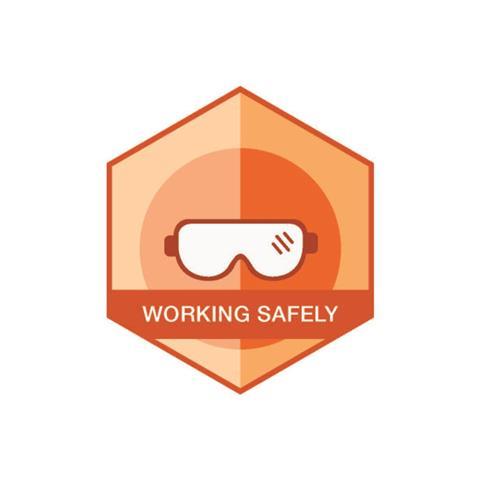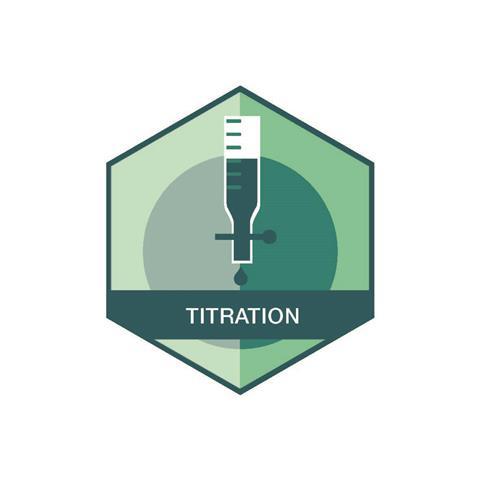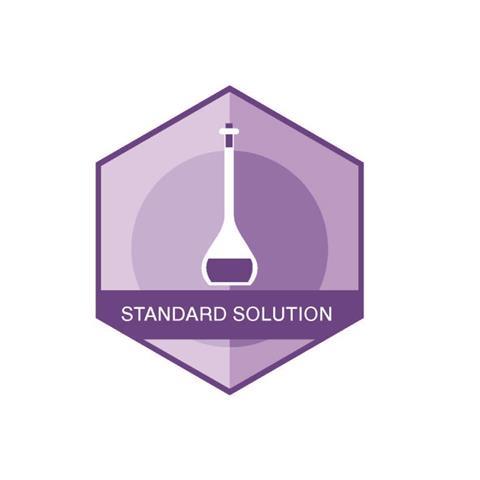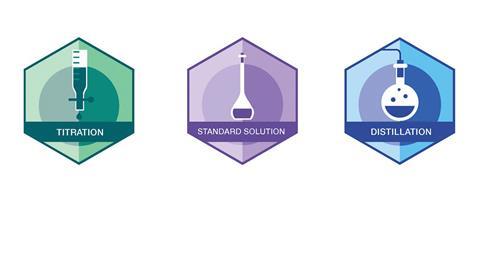Michael Seery champions the use of digital badges to acknowledge achievements in the laboratory
Badges will be very familiar to those involved in the Guiding and Scouting movements. Guides and Scouts collect a wide variety of badges from Astronomy to World Cultures. In each case, there is a list of criteria detailing what activities are required to achieve the badge. To achieve the Science badge in Girl Guides, for example, a Guide has to complete three tasks: plan and undertake two research activities showing a knowledge of the underlying science, discuss a recent science related news story, and find out more about some science achievements by visiting a museum or talking to a scientist. These are the set criteria required for this achievement to be acknowledged, and once there is evidence the criteria have been met, the badge is awarded. As these criteria are publicly available, people who view the badge know what was done to achieve it.
In our education systems generally, we are very good at acknowledging students’ overall achievements in a subject. Schools, examination boards, colleges and universities all have their own way to formally declare how well a student has fared in a particular subject. So if we know a student grade in A-level chemistry or their university chemistry exam, we have a general impression about what that means. But what we might not know is what aspects the student has done well in, nor what specific achievements the student attained beyond the scope of what was formally examined.

In response to this, the concept of using badges and ‘micro-accreditation’ has gained a lot of interest in education in recent years. The approach mirrors that championed by Scouts and Guides, although instead of issuing physical badges, these new education-related badges are digital. These micro-accreditations are not meant to replace the formal qualification the student may achieve; rather they aim to supplement these formal qualifications by providing a much richer picture of the student’s achievements and competencies developed over the course of their study.
Digital badges
Digital badges are more than just an image of a badge. They include lots of information, termed metadata, which is ‘baked’ into the badge. This information includes details about the badge issuer and the recipient. This means that badges are specific to an individual. The latter point is crucial, as the purpose of having badges in digital format means learners can share their badge on their own social media and professional platforms. The means of doing this is facilitated by the Open Badges ‘backpack’, which serves as an independent space on the web where any learner can build up their collection of badges.
The badging process
Let’s look at the process of issuing a badge. Suppose you wish to issue a badge to acknowledge student proficiency in mole calculations. The first thing to decide is what the criteria for the badge is. What will the learner have to do in order to obtain this badge? For this example, we will keep it simple, and state that the criteria will be that a learner must be able to calculate the number of moles of a substance given the grams and the molecular mass. The second thing to decide is what evidence is needed to conclude that the learner has met the criteria. Will they have to demonstrate the calculation several times? Will the question provide the molar mass directly or will the student need to work that out? We will keep it simple and say that the molar mass will be provided, and students need to demonstrate they can do one calculation of an unseen question.

Once the chemistry is decided, the next stage is to deal with the technical matters. To issue a badge, we will need to use a badging platform or a virtual learning environment (VLE). All major VLEs including Moodle, Canva, and Blackboard facilitate badge issuing (Blackboard call them achievements). Crucially, these sites issue badges as Open Badges, meaning students can push them out to their BackPack, so they can be displayed long after they have left the place where they were issued. Once the platform has been decided, we can define what needs to be achieved technically before the badge is issued. These are known as triggers. In our example, students will be asked a question online on the VLE, and once they get this right, this will trigger the release of the badge. The student will get a notification and they can opt to publish it to Open Badges and share it as they like.
Triggers can be more complex than just answering a quiz; you may require a student to view some course component on the VLE; they may need to upload a file or a link to where they have logged some evidence and this is reviewed before you issue the badge. Or it may be the evidence is provided in person, and after confirmation of this online by the teacher, the badge is issued. There is no end of possibilities.
Baking badges: not just a pretty picture
A key aspect of badges is that they contain information incorporated into the file details, or ‘baked’ into the badge. This information is entered when setting up the badge on the badging platform or the VLE. Details of currently available badging platforms are listed on the Open Badges website. Details baked in include:
- badge name (eg Mole Calculator badge)
- badge description (an brief overview of what the badge is awarding)
- criteria to be achieved (information on what the badge owner had to do to be awarded the badge)
- issuer (this can be the teacher’s name or the school name, for example)
- date issued, and if the badge is issued for a period of time, the date of expiry
- tags can also be used to identify the category the badge is in (eg education, chemistry, mole calculations)
- when a badge is issued the name of the awardee is also incorporated, so the badge becomes individual to that learner
Badge pathways – creating competency achievements

Having gotten used to designing individual badges, one exciting area to consider is the development of a suite of badges. The simplest design might be what is termed the stepping stone approach; each badge learners complete releases another achievement to be attained, so as learners move through the sequence, they demonstrate progressive development.
A second approach is the idea of a collection, where several individual components are achieved that when combined trigger the release of an overall competency badge. What might this look like in practice? Suppose we consider the overall competency: preparing a standard solution. This involves several different individual skills: students will need to know how to calculate moles. They’ll need to know how to use a balance, transfer solid to a volumetric flask and how to make the flask up to the mark. Each of the individual components could be a badged activity: mole calculations, using a balance and using the volumetric flask. If a student achieved all three of these, this could trigger the issuing of the badge for preparation of a standard solution. This meta-level achievement points back to the underlying skills badges it is made up from, and can be a useful way to draw together related skills and competencies.
Finally, a third approach is to be non-prescriptive, and make available a series of resources, allowing learners to opt to decide which of the badges they wish to earn. This may be suitable for more informal learning such as that achieved in science clubs.
Badge design
As well as developing the criteria and technical specifications of a badge, there is also a need to design the badge itself. There are some websites that can help with this or you can make your own using illustration software. A key aspect in design is that the badge should relate to the topic. While this is easier with laboratory skills, it might be more difficult with some other general topics, and it might be necessary to find some icons that relate to your particular activity. A good source of free icons of high quality is the Noun Project website.
A case study: badging lab skills
This year at the University of Edinburgh, we embarked on a pilot programme to explore the use of digital badges as a means of acknowledging competency in chemistry laboratory techniques. Following the strategy identified above for the mole calculator badge, the first step was to identify the criteria for the badge. We decided to build our work around three core techniques for first year chemistry: titrations, distillations and preparing standard solutions. The criteria for each were then specified so we could be sure that a student carried out the technique properly. For example, for titrations, the criteria included things like adding liquid to the burette, dropping the liquid below the zero-line, reading the start point to two decimal places, adding dropwise near the end of the titration and reading the final figure again to two decimal places.

The next stage is to consider how students could show evidence for this. We were inspired by work at Purdue University in the US that incorporated video in a laboratory badging assessment. We built on this idea in our implementation. We set peers working together, so students would video each other using their mobile phones while going through the technique. This meant students could easily obtain the evidence they needed to show us their successful demonstration of the technique. To obtain the badge, students uploaded their video to a video sharing site such as YouTube or the university’s own site and then submitted their link for review. These were viewed and assessed against the criteria set out above. Students who had completed successful demonstrations were issued with a digital badge.
As well as asking students to document their laboratory skills in this technique, this approach packs in some additional aspects. In order to prepare for their skills demonstration, students needed to watch exemplar videos on each technique, and we prepared videos on titrations, carrying out a distillation and preparing a standard solution. In addition the titration procedure required them to be familiar with pipetting, so they had to watch an exemplar video in this as well. Exemplars are a powerful means of promoting self-assessment, as students will be able to consider their own video and compare it to the exemplar.
Secondly, the laboratory demonstration required students to narrate their technique, which provided a rare opportunity to use oral narration rather than written work in an assessment. And thirdly, as well as videoing each other, students had to peer-review each other by ensuring their peer had successfully demonstrated all of the required components listed in the criteria. Overall the implementation was considered successful, and we noted students’ subsequent laboratory work showed a greater level of competency than in previous years.
Summary
Badges offer a useful way of acknowledging achievement in any aspect of learning. While individual badges can be a fun process, there is great potential in drawing together suites of badges that bring in different aspects of chemistry from class and laboratory work, helping students to link together different concepts. Let’s get badging!
Michael Seery is a reader in chemistry education at the University of Edinburgh, UK
For a list of useful resources, background information and futher reading, read this article online: http://rsc.li/EiC217p20
Resources, background information and further reading
- A digital badges FAQ
- Think Out Loud Club: An short online course explaining Open Badges and where you can earn your own Open Badge
- Open Badges website, listing several badge issuing platforms
- Video from the Education Cooperative explaining Open Badges
- Badging Lab Skills project: Documenting the development of a badging process for undergraduate laboratories, with badges and criteria forms available to downloa
- Websites to aid badge design
- Journal article describing video being used during assessment for a digital badge: M Towns et al, J. Chem. Educ., 92, 2015, 2038 (DOI:10.1021/acs.jchemed.5b00464)
- Exemplar videos from our case study:
- This article is based on this research paper: M K Seery et al, Chem Educ Res Pract, DOI: 10.1039/C7RP00003K
Images © Beth Goody Illustration










No comments yet